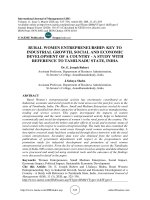Economic growth and economic development 228
Bạn đang xem bản rút gọn của tài liệu. Xem và tải ngay bản đầy đủ của tài liệu tại đây (26.76 KB, 1 trang )
This part of the book is a preparation for what is going to come next. In
some sense, it can be viewed as the “preliminaries” for the rest of the book. Our
ultimate purpose is to enrich the basic Solow model by introducing well-defined
consumer preferences and consumer optimization, and in the process, clarify the
relationship between growth theory and general equilibrium theory. This will enable
us to open the blackbox of savings and capital accumulation, turning these decisions
into forward-looking investment decisions. It will also enable us to make welfare
statements about whether the rate of growth of an economy is too slow, too fast or
just right from a welfare-maximizing (Pareto optimality) viewpoint. This will then
open the way for us to study technology as another forward-looking investment
by firms, researchers and individuals. However, much of this will have to wait for
Parts 3 and 4 of the book, where we will study these models in detail. In the
next three chapters, we will instead do the work necessary to appreciate what is to
come then. The next chapter will set up the problem and make the relationship
between models of economic growth and general equilibrium theory more explicit.
It will also highlight some of the assumptions implicit in the growth models. The
two subsequent chapters develop the mathematical tools for dynamic optimization
in discrete and continuous time. To avoid making these chapters purely about
mathematics, we will use a variety of economic models of some relevance to growth
theory as examples and also include the analysis of the equilibrium and optimal
growth.









